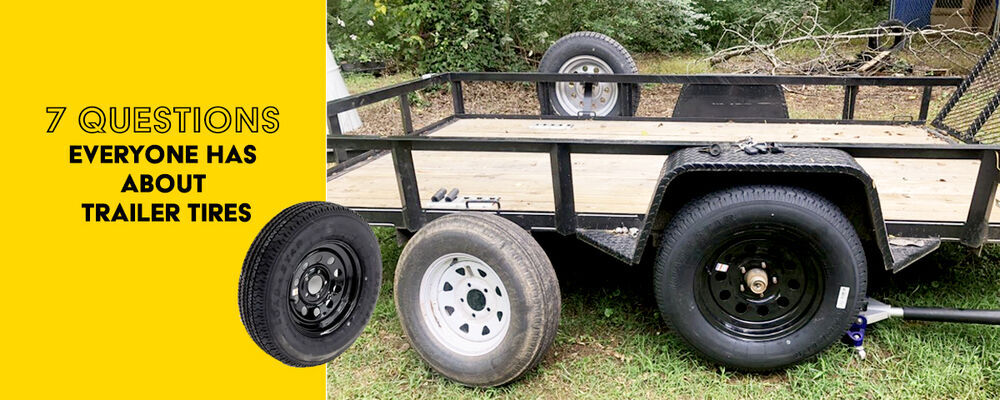Trailer tires typically last around 3-5 years. It depends on factors like usage, maintenance, storage, and weather conditions.
Trailer tires are an essential component of any trailer, and they play a crucial role in ensuring a safe and comfortable journey. However, like any other tire, they tend to wear out over time, which can lead to various issues, such as punctures, blowouts, and poor handling.
To prevent these problems, it is essential to know how long trailer tires last and when to replace them. In this article, we will discuss the factors that affect the lifespan of trailer tires, signs of wear and tear, and tips for maintenance to maximize tire life. By the end of this article, you’ll have a clear understanding of how to keep your trailer running smoothly and safely.

Credit: www.etrailer.com
Understanding The Lifespan Of Trailer Tires
Trailer tires are a crucial component of any trailer, but how do you know when it’s time to replace them? Understanding the lifespan of trailer tires is essential to prevent accidents caused by blowouts or tread separation, which can be costly and dangerous.
We will discuss the factors that impact the longevity of trailer tires, signs to look for indicating tire wear and tear, and why it is crucial to replace tires before they reach their limit.
Factors That Impact The Longevity Of Trailer Tires
Various factors affect the lifespan of trailer tires. Here are some of them:
- Age: As with any tire, the age of the tire is the most significant factor that can impact how long it lasts.
- Overloading: Overloading a trailer can cause the tires to wear out more quickly than they would usually.
- Inflation: Proper inflation is essential to prolong the life of your tires. Insufficient tire pressure can cause the tires to wear out prematurely.
- Storage: Proper storage and care of your tires can significantly impact their lifespan.
Signs That Indicate Tire Wear And Tear
Knowing when to replace your trailer tires can be a challenging task. Here are a few signs to look for indicating tire wear and tear:
- Tread depth: If the tread depth on a tire is below 2/32 of an inch, it’s time to replace it.
- Wear on the sides: If you notice excessive wear on the sides of your tires, this could be a sign that your tires are old or overloaded.
- Cracks and bulges: If you see cracks or bulges on the sidewall of the tire, it’s not safe to use anymore.
- Vibration and unusual noise: Any unusual vibrations or noises when driving your trailer could be a sign that it’s time to replace the tires.
Why It Is Crucial To Replace Tires Before They Reach Their Limit
Replacing your tires before they reach their limit is essential for safety reasons. Here are some reasons why:
- Blowouts: Tires that are worn out or old are more likely to have a blowout, which could cause an accident or damage to your trailer.
- Traction loss: Worn-out tires can’t grip the road surface as well as a new tire, which can lead to handling problems.
- Liability: If you’re involved in an accident that was caused by your worn-out tires, you could be held liable for any damages caused.
Understanding the lifespan of trailer tires is critical for anyone who owns a trailer. Knowing the factors that impact their longevity, signs of wear and tear, and the importance of replacing them before their limit can prevent accidents on the road.
Proper maintenance and care of your trailer tires will keep you and everyone on the road safe.
Maintenance Tips For Ensuring Longevity Of Trailer Tires
Trailer tires are essential for safe transportation of goods or vehicles, making it crucial to ensure their longevity. Tires that are not well-maintained tend to wear out faster and could cause accidents on the road. In this post, we will discuss some maintenance tips that can help ensure the longevity of trailer tires, including effective tire rotation strategies, how to properly inflate trailer tires, and tips for keeping tires clean and free from damage.
How To Properly Inflate Trailer Tires
Inflating trailer tires to the recommended pressure level is crucial in ensuring their longevity. Over-inflating or under-inflating tires can cause uneven wear and reduce their lifespan. Here are some tips for properly inflating trailer tires:
- Check the recommended pressure level from the tire manufacturer’s manual or tire sidewall.
- Use a reliable tire pressure gauge to check the tire pressure level regularly.
- Inflate the tires to the recommended pressure level when the tires are still cool, i.e., when the trailer has not been driven for long.
- Do not exceed the maximum pressure level indicated on the tire sidewall.
Effective Tire Rotation Strategies
Another way to extend the life of trailer tires is by regularly rotating them. This practice helps to distribute the wear evenly, preventing any one tire from wearing out faster than the others. Here are some effective tire rotation strategies:
- Rotate the tires at regular intervals, as recommended by the tire manufacturer.
- Swap the front tires with the rear tires and the left tires with the right tires to ensure a more even wear.
- Do not rotate tires that have signs of damage or uneven wear.
Tips For Keeping Tires Clean And Free From Damage
Keeping trailer tires clean and free from damage is another way to ensure their longevity. Here are some tips for cleaning and protecting trailer tires:
- Use soap and water to clean the tires thoroughly, removing any dirt, grime, or debris that could cause damage to the tires.
- Use protective covers to shield the tires against direct sunlight or harsh weather conditions.
- Inspect the tires regularly for any signs of damage, such as cuts, bulges, or punctures, and repair them immediately.
Proper maintenance of trailer tires is critical in extending their lifespan and ensuring safe transportation. Regularly inflating the tires to the recommended pressure level, rotating the tires, and keeping them clean and free from damage are some easy ways to help maintain their longevity.
Choosing The Right Trailer Tires For Optimal Longevity
Trailer tires are an essential component of a safe and smooth trailer ride. They are responsible for carrying heavy loads, navigating various terrains, and keeping the trailer stable on the road. But how long do trailer tires last? It’s a question many trailer owners ask, especially those who frequently travel long distances on roads with different conditions.
In this blog post, we’ll explore the factors that determine the longevity of trailer tires and the steps you can take to choose the right tires for your trailer.
Factors To Consider When Purchasing Trailer Tires
Before buying trailer tires, it is essential to consider several factors that will help you make the best decision. These factors include:
- Load capacity: Pay attention to the load capacity of the tires, which indicates the maximum weight they can carry safely. It is recommended to choose tires that can carry at least 20% more weight than your trailer’s weight.
- Terrain: Consider the terrain your trailer will be traveling on, such as asphalt, gravel, mud, or snow. Choose tires that are suitable for the terrain to avoid damage or premature wear and tear.
- Climate: Climate is another essential factor in determining the longevity of the tires. If you live in an area with extreme temperatures, either hot or cold, it is recommended to choose tires designed for those conditions.
- Tire size: Check your trailer’s manual and choose the tire size recommended by the manufacturer. Installing tires with the wrong size can lead to instability, damage, and accidents.
Expert Recommended Brands And Types
When it comes to choosing the right trailer tire brand, it can be overwhelming, considering the number of options available. However, some brands have consistently proven to provide high-quality tires suitable for various trailers.
- Goodyear endurance: This brand offers durable, long-lasting, and reliable tires that perform exceptionally well on various terrains.
- Michelin defender ltx: This brand offers excellent comfort and stability for trailers. It is also designed to last for a long time and provide better fuel efficiency.
- Bridgestone duravis m700 hd: Bridgestone is known for producing high-quality tires, and this brand is no exception. The bridgestone duravis m700 hd offers excellent durability, all-terrain performance, and fuel efficiency.
Common Mistakes To Avoid When Buying Trailer Tires
Purchasing the wrong trailer tire can lead to dangerous situations while on the road. Avoid these common mistakes when buying trailer tires:
- Choosing the wrong tire size: As mentioned earlier, installing tires with the wrong size can lead to instability, damage, and possible accidents.
- Ignoring the load capacity: Always consider your trailer’s load capacity and choose tires that can handle at least 20% more weight than the weight it will be carrying.
- Selecting the wrong tire for the terrain: Different terrains require different tire designs, so always choose tires that are suitable for the terrain you’ll be traveling on.
- Not considering the climate: Ignoring the climate factors when selecting trailer tires can lead to premature wear and tear or possible accidents.
Choosing the right trailer tire is crucial to ensure safe and comfortable trailer travel. Understanding the factors that affect the longevity of trailer tires and avoiding common mistakes when purchasing them will help you make well-informed decisions. So, ensure to make the right decision by considering all the factors and choosing one of the expert recommended brands and types for the best performance.
How To Identify Trailer Tire Issues
Trailer tires are critical to the smooth operation of your trailer. Like all other vehicle tires, they have a limited lifespan, and ignoring this fact could lead to safety issues. Understanding how to identify tire problems and addressing them promptly can help keep your trailer functioning optimally.
We’ll look at common causes of tire blowouts and how to prevent them, tips for repairing trailer tires, and maintaining them to ensure they stay in good condition.
Common Causes Of Blowouts And How To Prevent Them
Blowouts are a common problem with trailer tires, and they often occur due to some common reasons. Here are some of the major causes of trailer tire blowouts and what you can do to prevent them:
- Overloading: Overloading your trailer places stress on its tires, accelerating their wear and tear and causing them to wear unevenly. Ensure that you understand the weight capacity of your trailer and do not exceed it.
- Underinflation: Tires that are not inflated to the recommended tire pressure tend to wear out quickly. Regularly check the air pressure of your trailer tires and adjust it as needed, accounting for environmental conditions such as temperature changes.
- Damaged tires: Trailer tires can get punctured or damaged easily, compromising their integrity. Inspect your tires regularly for signs of damage such as cuts, cracking, or excessive tire wear. Replace any damaged or worn-out tires immediately.
- Cheap tires: Avoid using cheap or low-quality tires as they tend to have a shorter lifespan and could fail unexpectedly. Invest in high-quality, durable trailer tires from reputable brands.
Knowing How To Repair Trailer Tires
Being able to assess and repair tire damage can save you time, money, and prevent potential safety hazards. Here are some tips to remember when fixing trailer tires:
- Use a tire plug kit to repair small punctures in the tire tread. Remember to remove any foreign object lodged in the tire before repairing it.
- Use a tire patch kit to fix larger punctures in the sidewall or tread of the tire.
- If the tire has a sidewall puncture or a severe cut, it is best to replace the tire entirely.
Expert Tips For Keeping Trailer Tires In Good Condition
Keeping your trailer tires in good condition involves a few simple but essential practices. Here are some tips that will help keep your trailer tires in good condition:
- Regularly check the tire pressure and inflate them to the recommended level.
- Store your trailer in a cool, dry place that is away from direct sunlight and moisture.
- Inspect the tires for signs of damage, bulges, or excessive wear regularly.
- Rotate your tires every 5,000-8,000 miles to ensure even wear on all tires.
- Invest in a tire cover to protect them from uv rays and other elements that may cause damage.
Following these tips will help ensure that the trailer tires work optimally and reduce the likelihood of getting into accidents or experiencing unexpected tire failures.
Keeping your trailer tires in good condition involves regular maintenance and addressing any issues promptly. By following the expert tips outlined you can help prolong your trailer tires’ lifespan, save money, and ensure that you and your cargo remain safe on the road.
Frequently Asked Questions Of How Long Do Trailer Tires Last
How Long Do Trailer Tires Usually Last?
Trailer tires usually last between 5-7 years on average, but
it depends on the usage, the environment, and maintenance.
How Often Should Trailer Tires Be Replaced?
Trailer tires should be replaced every 3-5 years,
even if they look good on the surface. Regular inspection
can help spot any issues promptly.
What Factors Affect The Lifespan Of Trailer Tires?
The lifespan of trailer tires is affected by factors such as usage,
weather conditions, storage, maintenance, load capacity,
and the type of terrain they are used on.
How Do I Extend The Life Of My Trailer Tires?
You can extend the life of your trailer tires by ensuring proper
inflation, maintaining the recommended load capacity and speed,
storing them in dry cool areas, cleaning regularly, and inspecting for
signs of wear and tear.
How Do I Choose The Right Trailer Tires?
Choose the right trailer tires based on the size, the weight capacity
requirements, the type of terrain they will be used on, and the
weather conditions they will be exposed to. Ensure the tires you
choose are durable, reliable, and have the appropriate speed rating.
Conclusion
Trailer tires are essential components of a vehicle and it is important to pay attention to their wear patterns. Understanding how long trailer tires last allows you to properly plan for maintenance and replacement. From the discussion above, it is evident that several factors affect the lifespan of trailer tires.
These include environmental conditions, the frequency of use, the weight being carried, and regular tire maintenance practices. To ensure that your trailer tires last for as long as possible, keep them inflated to the recommended pressure, avoid overloading, and store them in a cool, dry place when not in use.
Regular inspection for signs of wear and tear is also important. By following these guidelines, you can be confident that your trailer tires will provide optimal performance and safety for you out on the road.

